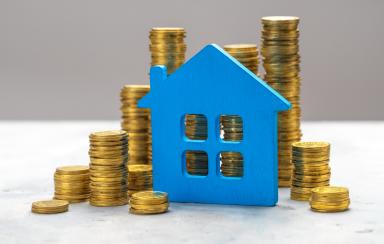How Soon Can I Refinance My Home After Purchase?

Refinancing your mortgage is one of the many financial possibilities that open up after you become a homeowner. While refinances are declining in the United States due to many factors, there are still opportunities for those who bought homes at higher interest rates. Refinancing can have many advantages, such as lower monthly payments and interest rates. But how soon after the initial purchase may you refinance your home's mortgage? It is a frequently asked question among homeowners who wish to shorten their mortgage. There is no one-size-fits-all answer to this question. This article will explore the nuances of early refinancing and the variables to consider before diving into the refinancing pool. If you wish to make an informed decision, we encourage you to spend a few moments reading what follows.
Will Mortgage Rates Go Down in 2023?
There is a chance that mortgage interest rates will drop in 2023, but not by much. As inflation stays constant and the Federal Reserve stands pat with its interest rate movement, mortgage interest rates for 30-year fixed loans will remain between 7.18% and 7.52% through the end of 2023. Experts predict a slight dip in the interest rates in October but are seeing a potential rise as we reach December. As long as the worries of recession, inflation, and the Fed stay where they’re at, interest rates will remain in the high six to low seven range for mortgages. Is 2023 the year for you to consider a refinance? It is doubtful if you’ve bought a house in 2022 or 2023.
However, if you bought your house at a time when you had a worse credit score, more debt, or a higher interest rate than the ones on the market now, then refinancing might be a good option for you to get a lower monthly payment with a better interest rate on your loan.
The Timing Consideration
After buying a home, a person's ability to refinance it may depend on various factors. There is typically no specified waiting period before you can refinance, but there are some general rules that apply. Before thinking about refinancing, many lenders advise waiting at least six to twelve months after acquiring a home. During this time, you can increase your home’s equity, raise your credit score, and even get a better loan rate. However, the ideal time to refinance can depend on several factors, including your unique loan terms, market conditions, and personal circumstances.
Other than timing, many other things can affect your choice to refinance your house early. The current interest rates are an important consideration. If they have drastically decreased since you obtained your first mortgage, refinancing may be a wise choice to lock in a lower rate and cut your monthly payments. Another important factor is your credit score. You qualify for better refinancing conditions with a higher credit score. Your financial objectives also matter. Reduced monthly payments, a shorter loan term, or access to the equity in your property can all be achieved by refinancing. Ultimately, the choice to refinance should align with your long-term financial goals and make sense in light of your particular situation and the current market conditions.
Benefits of Early Refinancing
Before exploring the advantages of early refinancing, it's critical to realize that this is a calculated financial move that can substantially affect your long-term financial stability. It can offer benefits that could help in achieving financial success when done at the proper time and with due thought. We'll review the most important advantages of early refinancing in the following section, including how it can result in lower interest rates, smaller monthly payments, quicker home equity building, and more. These advantages can significantly improve your financial security, offer chances for more savings, and help you reach your financial and homeownership goals.
Lower Interest Rates
Getting a lower interest rate is one of the most significant advantages of early refinancing. You can qualify for a better rate if market interest rates have decreased since you first took out your mortgage or your credit score has increased. A lower interest rate can produce significant savings over your term by lowering your monthly mortgage payments and the overall amount of interest paid.
Reduced Monthly Payments
Your monthly mortgage payments may be decreased by refinancing early, getting a cheaper interest rate, or extending the loan term. This can free up money for other financial objectives like saving for retirement, eliminating high-interest debt, or paying for home upgrades.
Debt Consolidation
Early refinancing might let you combine high-interest debt from credit cards or personal loans into your mortgage, which generally has a lower interest rate. This can help you manage your debt better and reduce the amount of interest you pay.
Shortened and Improved Loan Terms
You can refinance into a loan with a shorter term, like a 15-year mortgage, if your financial situation is better and you want to pay off your mortgage sooner. Even while your monthly payments may go up a little, you'll build up your home equity faster and spend less on interest over the course of the loan if you choose to do this. A chance to convert from an adjustable-rate mortgage (ARM) to a fixed-rate mortgage can also be available through early refinancing. Your monthly payments may become more stable as a result, shielding you against future increases in interest rates.
Factors To Consider
Although it can be alluring to refinance your mortgage shortly after buying your house, it's important to base that decision on several important variables. Early refinancing may have advantages, but it may also have disadvantages. In this section, we’ll look at some of the most important factors to consider before you refinance your mortgage early.
Interest Rates
The market's current interest rates will heavily influence the decision to refinance. Early refinancing may be financially advantageous if interest rates have significantly decreased since you took out your initial mortgage. Refinancing may not be as beneficial, though, if rates have not changed or increased since you bought your home.
Break-Even Point
The time it takes to recoup closing costs through lowered monthly payments is known as the break-even point. Refinancing early might not make sense if you want to sell your house or move soon because you might not earn a profit on your home before you do so.
Closing Costs
Closing costs for refinancing early may include title insurance, appraisal fees, application fees, and other expenses. If the potential savings from a lower interest rate or smaller monthly payments outweigh these expenditures, you should carefully assess your options before refinancing your mortgage early. Find your break-even point to estimate how long it will take to recover the initial amount you spent.
Financial Goals
Another factor to think about is your long-term financial goals. Are you hoping to reduce your mortgage's monthly payment, pay it off sooner, or use the equity in your house to fund other purchases or expenses? Your objectives and the refinancing conditions you select should be consistent when considering an early refinance.
Lender Policies and Requirements
Every lender may have different underwriting standards and procedures. Some lenders could be more lenient than others when it comes to specific requirements when you're trying to refinance your mortgage early. To discover the best refinancing conditions, compare offers from various lenders. Let’s look at some of the other factors and requirements lenders may require when you inquire about an early refinance.
Credit Score
Your credit score heavily influences the lender's decision on whether or not to approve your early refinance request. You are often a more desirable candidate for refinancing if you have a higher credit score. Because they are viewed as lower-risk consumers, lenders frequently give borrowers with high credit scores better terms on the loan.
Debt-To-Income Ratio
Your DTI ratio evaluates your income versus your monthly loan payments. DTI ratios have limits among lenders, and a lower ratio is typically preferred. Stalling for early refinancing with a high DTI may be more difficult.
Loan-To-Value Ratio
The amount of your loan in relation to the current appraised value of your house is known as the LTV ratio. Because they represent less risk, lenders seek lower LTV ratios. If the value of your property has increased since you bought it, you might have a lower LTV, which can enhance your chances of refinancing early.
Loan Type and Terms
Your refinancing choices may depend on the type of mortgage you have (such as a fixed-rate or adjustable-rate mortgage) and the conditions of your current loan. Prepayment penalties or special early refinancing limitations may apply to some loans.
Equity
The amount of equity you have in your house will be taken into account by lenders if you want to refinance early and take cash out. For the most part, you must have a certain amount of equity to be eligible for a cash-out refinance. Lenders may have different criteria, although typically, they fall between 15% and 20% equity.
Cash-Out Refinance Rules
If you are indeed looking to refinance early and do a cash-out refinance, there are specific rules and requirements that you have to consider. Every lender is different, but some of the larger lenders require that the existing first mortgage must be at least a year old at the time of the refinance unless the property was acquired in an inheritance or was legally awarded the property, owned by an LLC, or other requirements. Lenders will also have specific guidelines on how much money can be taken out, typically limited to a certain amount of the home’s value.
How To Refinance Your Mortgage
How do you start your refinance journey? This section provides a comprehensive guide to help you refinance your mortgage with easy-to-follow steps.
Step 1: Check Your Credit
Review your credit score and obtain a copy of your credit report. You may be able to qualify for better refinancing conditions with a higher credit score. To verify that the information on your credit report is accurate, challenge any inaccuracies you discover.
Step 2: Look at Current Interest Rates
Keep an eye on the market's current interest rates. Refinancing might be more appealing if interest rates are significantly lower than your current mortgage rate. Current rates can be found on websites, in financial news, and via your lender.
Step 3: Evaluate Your Home’s Value
Get a professional appraisal and use online resources and local real estate market information to ascertain the current value of your home. This figure will serve as the basis for your loan-to-value ratio (LTV), which may impact your ability to refinance.
Step 4: Gather Your Financial Documents
Prepare the required financial records for your refinance, such as pay stubs, W-2s, tax returns, bank statements, and any other evidence of income or assets. The application procedure will go more quickly if these are prepared.
Step 5: Shop Around for Lenders
Speak with several lenders and mortgage brokers to obtain estimates and compare offers. Ask about financing rates, closing expenses, and any other applicable fees. You can find the most beneficial terms by doing some comparison shopping.
Step 6: Choose a Lender and Loan Option
Choose a lender whose terms are favorable and in line with your objectives. Choose the loan that best meets your needs by discussing alternatives, such as fixed-rate, adjustable-rate, or cash-out refinances.
Step 7: Apply for Refinancing
Complete the lender application process of your choice. In a timely and precise manner, provide the necessary documentation. The lender will evaluate your application, verify your credit, and determine whether you qualify financially.
Step 8: Appraisal and Underwriting
The lender will appraise your property to determine its current value. The underwriters will also examine your application and financial records to determine your creditworthiness and loan repayment capacity.
Step 9: Approval and Closing
When your application has been approved, the lender will send you a loan estimate that includes information on the conditions and fees of the loan. Make sure it matches your expectations by giving it a thorough examination. The final loan documentation is reviewed and signed before the closing procedure starts. You and the new loan funds pay closing costs. If you refinance with a cash-out, you will get the money from the existing equity in your house.
How To Find a Mortgage Refinance Company
You may need a new lender if you cannot refinance with your current lender. If, after many Google searches, you still need to find a mortgage company that fits your needs, visit Expertise.com and go to their online directory of mortgage refinancing companies. You can find the offer that meets your needs in their comprehensive online directory. Here, you can compare companies, find the offer that works for you, and stop worrying about getting more calls about your refinance offer. Visit the directory today and get started on your refinance.
Expertise.com StaffAuthor
Step into the world of Expertise.com, your go-to hub for credible insights. We don't take accuracy lightly around here. Our squad of expert reviewers, each a maestro in their field, has given the green light to every single article you'll find. From rigorous fact-checking to meticulous evaluations of service providers, we've got it all covered. So feel free to dive in and explore. The information you'll uncover has been stamped with the seal of approval by our top-notch experts.

![The Best Mortgage Refinance Companies With No Closing Costs [2023] DUP IMAGE](https://images.ctfassets.net/k00sbju4hbzq/49QT5rcgTCbXVuaQTvpCGd/3127e458ad8c7d358765415e47accac7/Depositphotos_175405612_XL.jpg?fit=fill&w=384&q=75)


